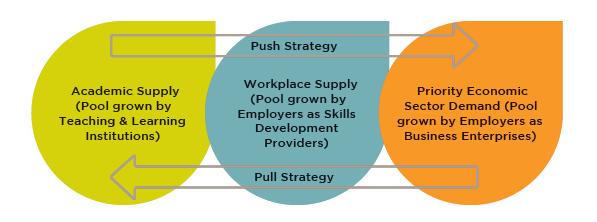Details Of Western Cape Government Apprenticeship Programme 2026/2027
Apprenticeships have proved that they have a significant impact on youth unemployment reduction. This is because an apprenticeship:
- ensures that training matches the needs within a company or industry,

- keeps up-to-date with changes in technology, work practices, and market dynamics,
- links classroom and workplace training so that young people acquire relevant skills,
- equips young people with critical core skills, such as problem solving, teamwork, and communication,
- offers young people a small income while preparing for the job market, and
- helps them clear the hurdle of having no job experience, a barrier that prevents many university graduates from securing their first job.
Therefore, in support of and in alignment with national processes, we’re promoting the Apprenticeship Game Changer to leverage the power of work-based learning through apprenticeships to improve our citizen’s livelihoods.
Our Apprenticeship Game Changer
The Apprenticeship Game Changer will focus on identifying the critical occupations for which there is, or will be high demand, but inadequate supply within the 5 priority economic sectors and implementing a strategy to tackle these shortages.
The main goal of the Apprenticeship Game Changer is to achieve sufficient, appropriately qualified technical and vocational skilled people to meet the needs of prioritised economic growth areas in the Western Cape.
The provincial government has set a target of introducing 32 500 qualified apprentices into the labour market by 2026. This target includes apprentices who’ll qualify as:
- artisans,
- semi-skilled workers who achieve partial qualifications, and
- top-up qualifications for existing artisans and semi-skilled workers.
We’ll be focusing on the Western Cape’s 5 key economic sectors prioritised under our growth strategy, Project Khulisa, which aims to add an additional 343 000 jobs in these sectors to the Western Cape economy by 2026. These sectors are:
- Oil and Gas,
- Agri-processing,
- Tourism,
- Energy , and
- ICT (Broadband) .

“We recognise that if we want to break the cycle of poverty that so many of our communities are trapped in, we need to create ladders of opportunities for our youth so that they become productive and employable adults with brighter futures. We have to ensure that a shortage of skills isn’t an inhibitor to this ambitious target,” Premier Zille said.
We are continuously working towards strengthening our partnerships with employers, learning institutions and SETA’s across these sectors in order to achieve our objectives. As a result a major priority for 2026 will be funding for poor students and our objectives include:
- developing collaborative interventions between learning institutions and employers within specific geographic areas to provide financial assistance to learners,
- the province will focus on identifying learners who require financial support and aligning them with employers within our priority economic sectors, and
- the Economic Development Department’s advisory forums will work with employers and key SETA’s to simplify the processes businesses need to follow to access funds.
A second priority is the up-skilling of our youth so that employers want to appoint them. We’ll achieve this by:
- providing academic support to learners who are at risk of achieving between 40 and 49% for maths, using eLearning as a means of providing maths tutorship,
- identifying learners by working with learning institutions and the top 20 Employers in priority growth sectors, and
- having employers provide funding for mentors who can support these at risk learners.
We’ll also prioritise career development, focusing on qualified workers already employed in our priority sectors. In the coming months we’ll undertake a gap analysis of short and specialised courses on offer and ensure these are aligned to employers’ needs. At school level, we’ll focus on work readiness and life orientation programmes for learners in technical high schools and academic schools.
Getting everyone on board
We aim to achieve our Game Changer goals by focusing on a “push and pull” approach:
- A push strategy where learning institutions supply enough appropriately qualified, workplace ready learners to meet the needs of employers in the priority sectors, and
- A pull strategy where employers increase their intake of apprentices while clearly indicating the skills they need in their businesses.

In order to ensure that the learners graduating fit the skills needs of employers, we’re also setting up a real-time data system that will help forecast where the demand will lie over the next few years. Critical to the success of this data system, however, is the direct engagement with employers to hear what skills they require in their workplace.
The Western Cape Government would be setting up engagements with the leadership of companies over the next few months in order to discuss their needs and the role they need to play in supporting the game changer.
Our government is also facilitating the establishment of Technical Advisory Forums for each priority economic sector that will be convened and coordinated by TVET Colleges. These forums will include representatives from government, learning institutions and business and will perform a number of functions including:
- identifying occupations needed within the relevant economic sector,
- short course or specialised training required by the sector, and
- learners requiring financial assistance or programme support.
Tackling the issue head-on

“While the Western Cape has the lowest youth unemployment rate in the country, it still stands at an undesirable 29.9% and has deteriorated by 4% over the past 5 years. At the same time, half a million jobs remain vacant across the country because a lack of appropriate skills,” said Premier Zille.
The reasons for the skills shortages in the key sectors of our economy include:
- Poor maths and science pass rates at schools,
- A lack of awareness of scarce skills and related employment opportunities,
- Learners preferring to enrol at universities, which are viewed as superior to technical colleges,
- Negative perceptions of the status of artisans, and
- A shortage of funding and workplace based learning opportunities.
Apprenticeships are critical in addressing these skills shortages.
On the road to success
Working ‘Better Together’ is important if we want to take our province forward and progress can only be realised if we establish good working relationships and partnerships between government, citizens, civil society and business. This isn’t only critical to the success of our Apprenticeship Game Changer, but also in the realisation of our youths’ dreams and career aspirations.